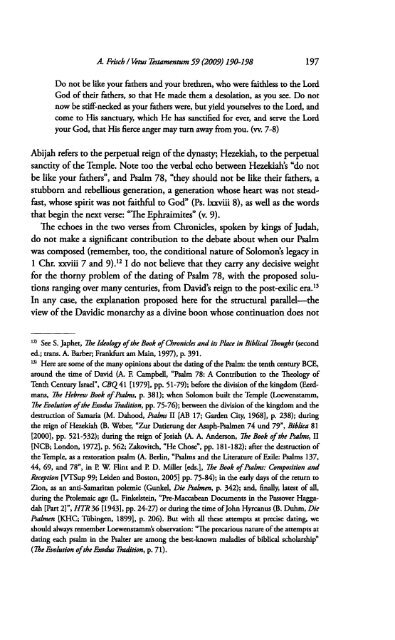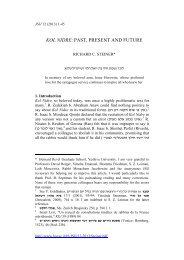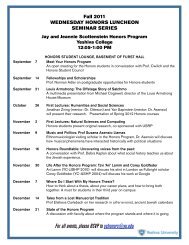David: The Meaning of a Structural Parallel in Psalm 78 - Yeshiva ...
David: The Meaning of a Structural Parallel in Psalm 78 - Yeshiva ...
David: The Meaning of a Structural Parallel in Psalm 78 - Yeshiva ...
You also want an ePaper? Increase the reach of your titles
YUMPU automatically turns print PDFs into web optimized ePapers that Google loves.
A Frisch I Vetus Testamentum 59 (2009) 190-198 197Do not be like your fathers and your brethren, who were faithless to the LordGod <strong>of</strong> their fathers, so that He made them a desolation, as you see. Do notnow be stiff-necked as your fathers were, but yield yourselves to the Lord, andcome to His sanctuary, which He has sanctified for ever, and serve the Lordyour God, that His fierceanger may turn away from you. (w. 7-8)Abijah refers to the perpetual reign <strong>of</strong> the dynasty; Hezekiah, to the perpetualsanctity <strong>of</strong> the Temple. Note too the verbal echo between Hezekiahs "do notbe like your fathers", and <strong>Psalm</strong> <strong>78</strong>, "they should not be like their fathers, astubborn and rebellious generation, a generation whose heart was not steadfast,whose spirit was not faithful to God" (Ps. lxxviii 8), as well as the wordsthat beg<strong>in</strong> the next verse: "<strong>The</strong> Ephraimites" (v. 9).<strong>The</strong> echoes <strong>in</strong> the two verses from Chronicles, spoken by k<strong>in</strong>gs <strong>of</strong> Judah,do not make a significant contribution to the debate about when our <strong>Psalm</strong>was composed (remember, too, the conditional nature <strong>of</strong> Solomons legacy <strong>in</strong>1 Chr. xxviii 7 and 9). 12 1 do not believe that they carry any decisive weightfor the thorny problem <strong>of</strong> the dat<strong>in</strong>g <strong>of</strong> <strong>Psalm</strong> <strong>78</strong>, with the proposed solutionsrang<strong>in</strong>g over many centuries, from <strong>David</strong>s reign to the post-exilic era. 13In any case, the explanation proposed here for the structural parallel—theview <strong>of</strong> the <strong>David</strong>ic monarchy as a div<strong>in</strong>e boon whose cont<strong>in</strong>uation does not12)See S. Japhet, <strong>The</strong> Ideology <strong>of</strong> the Book <strong>of</strong> Chronicles and its Place <strong>in</strong> Biblical Thought (seconded.; trans. A. Barber; Frankfurt am Ma<strong>in</strong>, 1997), p. 391.13)Here are some <strong>of</strong> the many op<strong>in</strong>ions about the dat<strong>in</strong>g <strong>of</strong> the <strong>Psalm</strong>: the tenth century BCE,around die time <strong>of</strong> <strong>David</strong> (Α. E Campbell, "<strong>Psalm</strong> <strong>78</strong>: A Contribution to the <strong>The</strong>ology <strong>of</strong>Tenth Century Israel", CBQ41 [1979], pp. 51-79); before the division <strong>of</strong> the k<strong>in</strong>gdom (Eerdmans,<strong>The</strong> Hebrew Book <strong>of</strong> <strong>Psalm</strong>s, p. 381); when Solomon built the Temple (Loewenstamm,<strong>The</strong> Evolution <strong>of</strong> the Exodus Tradition, pp. 75-76); between the division <strong>of</strong> the k<strong>in</strong>gdom and thedestruction <strong>of</strong> Samaria (M. Dahood, <strong>Psalm</strong>s II [AB 17; Garden City, 1968], p. 238); dur<strong>in</strong>gthe reign <strong>of</strong> Hezekiah (B. Weber, "Zur Datierung der Asaph-<strong>Psalm</strong>en 74 und 79", Biblica 81[2000], pp. 521-532); dur<strong>in</strong>g the reign <strong>of</strong> Josiah (A. A. Anderson, <strong>The</strong> Book <strong>of</strong> the <strong>Psalm</strong>s, II[NCB; London, 1972], p. 562; Zakovitch, "He Chose", pp. 181-182); after the destruction <strong>of</strong>the Temple, as a restoration psalm (A. Berl<strong>in</strong>, "<strong>Psalm</strong>s and the Literature <strong>of</strong> Exile: <strong>Psalm</strong>s 137,44, 69, and <strong>78</strong>", <strong>in</strong> P. W. Fl<strong>in</strong>t and P. D. Miller [eds.], <strong>The</strong> Book <strong>of</strong> <strong>Psalm</strong>s: Composition andReception [VTSup 99; Leiden and Boston, 2005] pp. 75-84); <strong>in</strong> the early days <strong>of</strong> die return toZion, as an anti-Samaritan polemic (Gunkel, Die <strong>Psalm</strong>en, p. 342); and, f<strong>in</strong>ally, latest <strong>of</strong> all,dur<strong>in</strong>g the Ptolemaic age (L. F<strong>in</strong>kelste<strong>in</strong>, "Pre-Maccabean Documents <strong>in</strong> the Passover Haggadah[Part 2]", HTR 36 [1943], pp. 24-27) or dur<strong>in</strong>g the time <strong>of</strong> John Hyrcanus (B. Duhm, Die<strong>Psalm</strong>en [KHC; Tüb<strong>in</strong>gen, 1899], p. 206). But widi all these attempts at precise dat<strong>in</strong>g, weshould always remember Loewenstamm s observation: "<strong>The</strong> precarious nature <strong>of</strong> the attempts atdat<strong>in</strong>g each psalm <strong>in</strong> the Psalter are among the best-known maladies <strong>of</strong> biblical scholarship"{<strong>The</strong> Evolution <strong>of</strong> the Exodus Tradition, p. 71).







